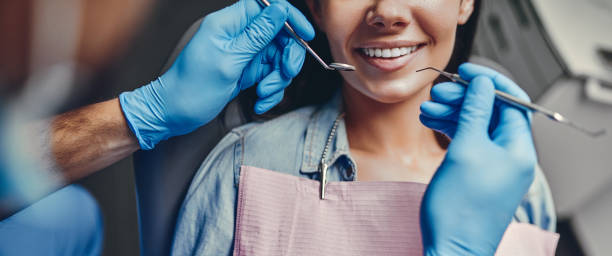If you have been diagnosed with COVID-19, then you likely have many fears and concerns. Millions of people have died due to complications caused by the deadly virus, so COVID-19 should never be taken lightly.
Swollen and infected gums may increase the risk of death and complications if you have recently been diagnosed with the coronavirus. Fortunately, there are many steps that you can take in order to accelerate your recovery and reduce the risk of spreading the highly contagious virus to others.
Good dental health is not only essential for maintaining your general health and well-being, but may also save your life. Here, we will discuss how optimizing your oral health may prevent or reduce complications related to COVID-19.
What is periodontal disease?
Periodontal disease is very common, and affects millions of people. In fact, it is one of the most common types of dental disease or ailment in the world. Periodontal disease is also known as gum disease. It is characterized by an inflammatory infection of the gum tissue in the mouth. Gum disease is a chronic condition that will not go away on its own.
Gum disease is usually caused by plaque accumulation. Plaque is a type of biofilm that adheres to your gums and teeth due to its marked stickiness. Periodontal disease usually progresses slowly, so it can be detected during a routine dental checkup.
However, if left untreated, it will cause your gums to recede, thus leading to eventual bone loss. Pronounced gum disease will also lead to the complete loss of your teeth, which may require you to wear dentures in order to talk and eat.
Importance of Oral Hygiene
It is important to take care of your gums, teeth, and mouth. Do not take your oral health for granted. Tooth decay is the most common type of dental disease in the world, affecting billions of people globally.
Food particles may become lodged between your teeth while you eat. If you do not brush and floss your teeth properly, then food may become trapped between your teeth. So, learning the fundamentals of proper oral hygiene are a must. By learning the basics, you will reduce the risk of developing cavities in the future. Gum disease and tooth loss can also be prevented by learning how to brush and floss properly.
Proper dental care is even more important today due to the global pandemic. Practicing good oral habits will help protect your mouth, gums, and teeth, and may also reduce the risk of contracting and spreading the coronavirus in the future.
How Oral Hygiene Affects Overall Wellness
The mouth has many benefits and functions, but it also serves as a breeding ground or vector for pathogens and bacterial growth. Fortunately, you can reduce the risk of infections and even lower bacterial levels in your mouth by practising optimal oral hygiene.
It is also possible for the bacteria in your mouth to spread to other parts of your body via the bloodstream. Many heart-related problems, such as arterial plaque formation, are connected to poor eating and brushing habits. You can reduce the risk of heart disease by eating a balanced diet, exercising regularly, and brushing and flossing properly after meals.
Tips to Maintain Proper Oral Hygiene
You should brush at least twice a day. Brushing three times a day, after meals, is highly recommended. Your toothbrush should also be kept clean. Wash it thoroughly with warm water, ensuring that there is no gunk leftover. You can use a toothbrush holder or case so that there is no risk of your toothbrush touching that of another person who lives with you.
Particles from the toilet or shower may also come in contact with your toothbrush and other toiletries. Do not leave your toothbrush and floss exposed out in the open. Your oral health products and tools should also be disinfected on a daily basis.
Doorknobs, toilet handles, faucets, and showerheads should be cleaned to reduce the spread of germs. Also, if you smoke, we would strongly recommend that you quit smoking. Smoking has been related to cancer, lung disease, stroke, and heart disease. As well, smoking may cause dry sockets, teeth staining, and may slow down the healing of any gum or dental problems. Smoking also causes bad breath.
If you are ill with the coronavirus, flu, or even the common cold, then you should keep your oral health items in a separate closet or storage cabinet while you are sick. It is also paramount that you never share your toothbrush with another person, even if they are related to you.
Nearly 25% of those who have been infected with the coronavirus exhibit no symptoms, meaning they are asymptomatic. An asymptomatic person can still be a carrier, meaning they can still infect another person with the coronavirus unknowingly.
While brushing is important, flossing may be just as important, if not more so. If you do not know how to floss, then there are video tutorials that you can access online for free. You can ask your dentist to perform a live demonstration as well.
You may also use mouthwash after you are done brushing and flossing. However, alcohol-based mouthwash products may cause your mouth to sting. You may want to opt for an alcohol-free mouthwash, as they tend to be less abrasive.
Be Proactive
The quality of your teeth is a key indicator of superb health. Periodontal disease, gingivitis, and other common oral health problems can be prevented by practicing good oral hygiene habits on a daily basis. You will also reduce the risk of developing other health problems, such as the coronavirus, by being vigilant with your oral health.
Avoid sharing dental hygiene instruments, practice social distancing (at least 6 feet), wash your hands with soap and water, and avoid touching your mouth, nose, and eyes. Remain home if you have any coronavirus symptoms, which include coughing, fever, trouble breathing, headache, fatigue, and the inability to taste or smell food.















